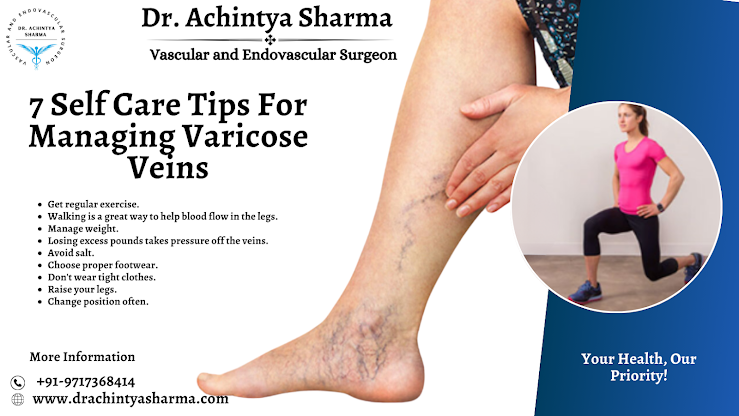7 Self-Care Tips for Managing Varicose Veins That Can Be Effective
1. Stay Active:
Physical activity is critical to good blood circulation and reduces the risk of developing varicose veins. Walk, swim, or cycle regularly to enhance blood movement and strengthen the legs’ muscles. To keep your veins healthy and functional, do at least 30 minutes of moderate exercise most days of the week.
2. Elevate Your Legs:
Situations where you put your feet higher than your heart level may reduce the aching in your legs as well as swelling from varicose veins. At various times throughout each day, take time to put your legs up on an elevated cushion or footrest to encourage blood flow back towards the upper body portion and then return over again into the lower parts which helps relieve pain, reduce swelling, and averting other damages.
3. Stay at a Normal Weight:
Excess body weight can increase the pressure on your veins, raising the chance of either developing varicose veins or worsening those already present. To have the right weight and circulation, you need a balanced diet and regular exercise plan.
4. Put on Compression Stockings:
Compression socks are designed to put gentle pressure on your limbs, thereby promoting blood circulation while minimizing tissue swelling. Keep wearing such stockings daily especially when standing or sitting for long periods to give veins support and relieve discomfort. Before you purchase compression stockings talk to your healthcare provider about what level of compression might be right for you.
5. Steer clear of extended standing or sitting:
The condition could be exacerbated by extended hours of either standing up or sitting down because this will help apply more pressure onto leg veins which are varicose in nature. If your job involves prolonged sitting or standing, ensure that you take short breaks regularly to move around and stretch your legs too. Do not cross your legs while seated since this compromises blood flow and increases the chances of vein complications occurring.
6. Observe Good Nutrition:
A nutritious diet containing fiber, antioxidants, and vitamins can support vein health and reduce inflammation. In order to ensure good vascular health, include an abundance of fruits, vegetables, and whole grains; also consume lean proteins in your meals. Processed foods, salty snacks as well as sugary drinks should be taken minimally since they facilitate water retention and inflammation.
7. Keep Hydrated:
Proper hydration is essential for healthy blood flow prevention of blood clots which can worsen varicose veins condition. Drink a lot of water all through the day so that you can keep your body hydrated at all times promoting its circulation levels. Caffeine and alcohol intakes have to be limited since these cause dehydration leading to aggravated symptoms of the veins.
Conclusion:
Finally, to resume, implementing some of the following practical self-care tips will contribute immensely to the quality of life of those who usually suffer from varicose veins. Compressed veins, working against gravity, become enlarged and twisted. But simple exercises, lifting the legs, compressing stockings to provide support, and maintaining a healthy weight can help people relieve their symptoms and prevent complications from developing. Moreover, following a daily meal plan containing more fiber and anti-oxidants provides a significant impact on circulation and the whole vascular function of the body. Besides, mindful and stress-resistant techniques are essential for limiting difficulties and promoting enhanced well-being in general. The main point to emphasize is that constancy is vital; one can succeed in reaching for effective self-care practices once making them an integral part of daily life. This being the case, ensure to seek medical help from your health provider for individually-centred options and treatment. People, by creating a self-care plan and adopting the methods stated above, can easily manage varicose veins and contribute to the fulfillment of their health objectives and in doing so, improve their quality of life.

.png)


.jpg)
Comments
Post a Comment